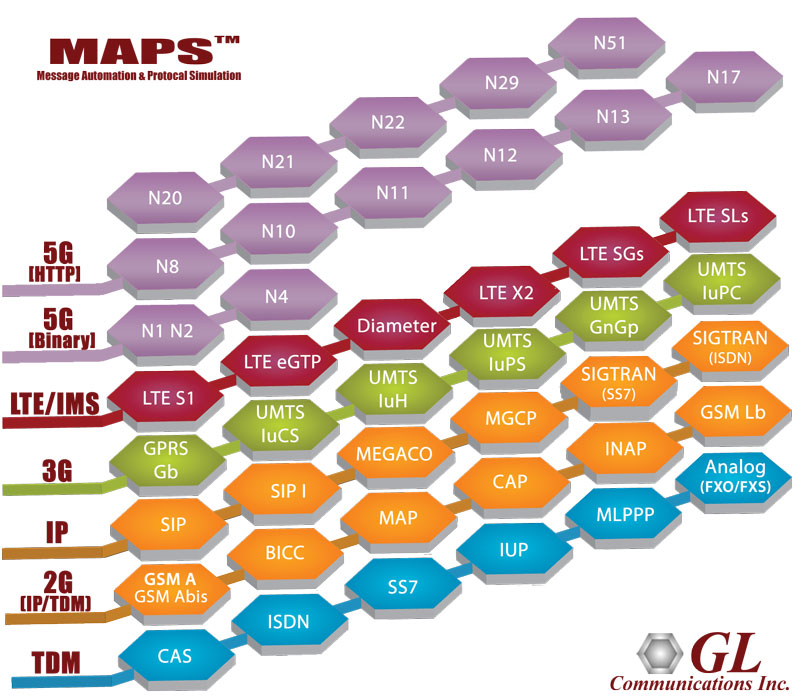Emulation and Verification of Communication Protocols
Welcome to another September, 2013 issue of GL Communications' Newsletter providing information and insight into Emulation and Verification of Communication Protocols.

Overview
GL's Message Automation & Protocol Simulation (MAPS™) is a protocol emulation and conformance test tool that supports a variety of protocols. The product also supports all types of traffic simulation - Voice, Digits, Tones, Fax, SMS, Email, HTTP, and Mobile data traffic.
The product MAPS™ includes various ready-to-use test cases to support the testing of real-time entities. Along with automation capability, the application gives users the unlimited ability to edit messages and control call scenarios (message sequences). "Call Scenarios" are generated through scripts.
Supported Protocols
Features
Single Framework - Single Platform
- Significantly reduces user efforts to simulate multiple protocols / interfaces
- PC based test solution, no bulky hardware
- Makes testing across any network easy and feasible
- Perform end-to-end QoS and call control testing from TDM-to-TDM, TDM-IP-TDM, or an All-IP network
- Test inter-working of legacy networks (such as CAS, SS7 and ISDN) with IP networks (such as SIP, MGCP, MEGACO, SIGTRAN), and the latest technologies including UMTS, LTE, better known as 3G, and 4G respectively
Multi-Interface and Multi-Protocol Simulation
- Test any node in a network using respective protocols communicating with that node
- Simulate multiple interfaces carrying signals or data across the network
Customize Test Scenarios using Scripts
- Build valid or invalid test cases
- Simulate a complete protocol state machine
- Offers ‘syntax-ready commands’ to easily build scripts
- Test protocol conformance to standards
- Simulate impairments and real-time traffic conditions
Customize Protocol Messages
- Modify any message, message parameters, and/or information elements
- Add, modify or remove any optional parameter depending on specific feature of interest
- Perform packet level fault insertion by impairing any bit / byte of a message
Ready-to-use scripts
- Includes ready-to-run scripts for simulating important call scenarios / procedures
- Syntax-ready commands in script reduces dependency on technically skilled resources
- Reusability, easy maintainability and reduced ‘time-to-market’
Multiple Link & Transport Layer Simulation
- Supports multiple transports for IP network (TCP, UDP and SCTP)
- Supports both IPv4 and IPv6
- Simulates multiple SS7 (MTP) links, LAPD Links
Performance, Load, Stress Testing
- Test to measure the capability of an entity for various traffic conditions
- Load generation to set calls per second, maximum active calls handling capacity, busy hour call attempts, and calls attempted by the simulator at one shot (Burst)
- Stress testing for out-of-boundary conditions
Test Automation
- Define multiple auto-handlers to an incoming message
- Automate the execution of the multiple calls sequentially or randomly
- Handle the incoming messages
Command Line Interface for Remote Call Control
- Capability of accepting commands from scripting tools such as the TCL, Python and others
- Control and operate MAPS™ remotely, also gather statistics, logs and reports
- Availability of MAPS™ APIs to integrate with any of the other applications
- Supports generation and verification of various traffic types - Digits, Tones, Voice, Fax... over TDM, Wireless, and Packet networks
- Supports generation and verification of data traffic such as SMS, Email, FTP, Web (HTTP), Video... over GPRS, UMTS and LTE
- Establish a voice session, monitor power level, signaling bits, or perform loopback testing real-time voice traffic (call establishment and traffic generation / detection) process through scripts
- Transmission of prerecorded or real-time traffic files over established channels
- Record incoming traffic to files
- Supports almost all industry standard codecs - G711-ULaw, G711-ALaw, AMR, G.726 with VAD, SMV, ISAC, ILBC, and SPEEX
Additional GUI Features
- Ladder diagram of the messages with detailed decode of each message
- Call statistics summarizing the entire testing with a tabular and graphical view
- Scripted call generation and automated call reception
- Control the test flow by defining events
- User-defined, auto-generated, track specific events & error logs to identify syntax errors, transport errors, decode errors, and more
Command Line Interface for Remote Access (requires additional licensing)
- MAPS™ can be configured as server-side application, to enable remote controlling of the application through multiple command-line based clients.
- Multiple MAPS™ CLI servers can also be controlled remotely from single client application (such as TCL, Python, etc) Supported clients include C++, TCL, Python and others.
- User can remotely perform all functions such as start test bed setup, load scripts and profiles, apply user events such as send digits/file/tones, detect digits/file/tones, dial, originate call, terminate call, start and stop traffic and so on.
- User can also generate and receive calls through commands. The client applications are distributed along with MAPS™ Server application.
For comprehensive information on the Simulation and Verification of Communication Protocols, you can refer to MAPS™ web page.

 Back to Newsletter Index Page
Back to Newsletter Index Page